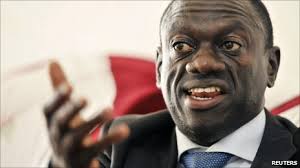THE LAST WORD | ANDREW M. MWENDA | Opposition leader Dr. Kizza Besigye has argued that elites in Uganda are the most useless group in the country. Let us test this thesis and seek to prove what it reveals. The beginning point is poverty statistics from our Uganda Bureau of Statistics (UBOS) 2018. We know that the more educated one is, the higher is the likelihood that they will be living in urban areas, have a higher income and therefore the more elite they will be. The highest concentration of elites in Uganda is in Kampala and Wakiso district. These are the places letting Uganda down, right?
The districts in Uganda with the lowest number of people living in poverty are Kampala (2.6%) and Wakiso (2.7%). The districts with the highest number of people living in poverty are Kotido (73.4%) and Nabilatuk (73.1%) both located in Karamoja region. While NRM has failed to deliver much to these semi educated, rural and poverty-stricken people, Besigye would like us to believe that these are the real hope for Uganda who understand our reality better and thus are able to make superior political choices than elites in Kampala, right?
In the 2016 elections, Besigye beat President Yoweri Museveni in Kampala with 66% of the vote against 31%. In Wakiso, Besigye won by 60% against 37% for Museveni. Meanwhile the semi literate and poverty-stricken people of Kotido voted 91% for Museveni and only 3.5%. In Moroto Museveni got 90% against Besigye’s 5.6%. Besigye is therefore saying the elites in Kampala and Wakiso who vote overwhelmingly for him have let the country down – unless, of course, Besigye is taking of the richest one percent of Ugandans. This group is highly privileged and therefore invested in the status quo. To expect them to vote for change is naïve.
There are other factors that influence voter behavior and identity is a powerful one. Museveni has spent his political life arguing against the role of identity (ethnicity or religion) in shaping political choices. But his arguments cannot change human nature – we humans are genetically tribal in our thinking. I will not devote space dealing with this subject because the neural psychologist, Joshua Greene, has written an insightful book on the subject titled “Moral Tribes” which I highly recommend for you the reader.
The other districts with the lowest levels of poverty in the top ten districts of Uganda are Sheema 5.9%, Bushenyi 6.9%, Mbarara 7.0%, Kalangala 7.2%, Kiruhura 8.2%, Kabarole 8.7% Mukono 8.9% and Rukungiri 8.9%. Except for Mukono and Kalangala, all these districts are located in Museveni’s tribal homeland of Ankole and its northern neighbour Toro. Kalangala must be rich because of BIDCO and its oil palm business. See how wrong I was when I fought Museveni in 2005 for giving land and tax incentives to BIDCO to begin planting oil palm in that island? Mukono is in the top league because it is a town nearest to Kampala. Theirs riches are not tribal but an urban dividend.
Let us look at voting patterns in these places where fewer people live in poverty even though they are located in Museveni’s tribal homeland. In the 2016 elections, in Sheema Museveni got 70% of the vote against Besigye’s 28%, in Bushenyi Museveni got 69%, Besigye 30%; in Mbarara Museveni got 71%, Besigye 28%, in Kalangala, Museveni got 54%, Besigye 43%; in Kiruhura Museveni got a cool 87%, Besigye a miserable 8%; in Kabarole Museveni got 76%, Besigye 22%; Mukono Museveni got 41%, Besigye 47% and in Rukungiri Museveni lost to Besigye by 48% to 50%.

Leave a Reply